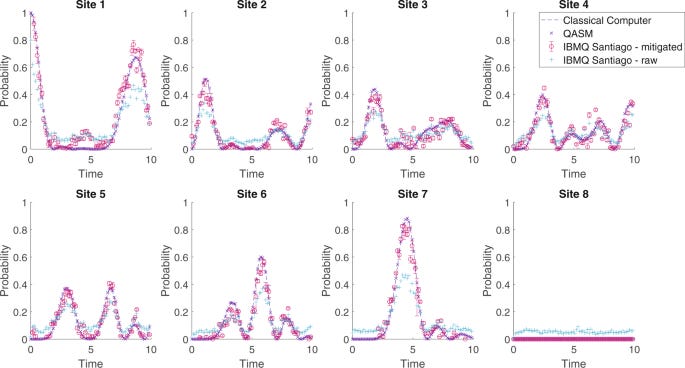Quantum Computing Files: Thursday's edition (1st July)
Quantum Computing Files: a newsletter about Quantum.
Today on Quantum Computing Files, the Thursday’s edition from the first day of July 2021, we will be fascinated with a research paper demonstrating how molecule simulation can already be done with the universal quantum circuit model approach to Quantum Computation using the IBM-Q cloud-based solution. And we also watch a video from Xanadu, a highlight presentation going back to November 2020, reminding us why the photonic approximation to Quantum Computation could turn out to be one of most promising for the future of the field. Both fascinanting pieces of content!
A Quantum Research Paper to read
Simulating molecules on a cloud-based 5-qubit IBM-Q universal quantum computer (Nature Communications - June 2nd)
Introduction
Many problems in physics, chemistry, nanotechnology and even biology require knowledge about the evolution of quantum systems. The exponential scaling of the computational overheads needed to simulate the expanding number of states of such systems as the number of particles increases limits the usefulness of classical simulators. Building simulators from other quantum systems offer a way around the problem1.
In this work, we undertake the preliminary steps towards simulating the equations of motion of systems where the environment plays an important role on NISQ devices. To this end, we build circuits from fundamental blocks which act on a restricted number of qubits, within the architectural constraints of the state-of-the-art quantum computers available today. We develop software for the construction of arbitrary three-qubit circuits and benchmark their effectiveness in the context of simulating unitary evolutions. We propose an error model for the study of these circuits and show that it can be used as a good approximation for a general quantum error channel. Furthermore, we demonstrate that the errors are only sensitive to the structure of the circuit and not the exact parametrisation. These are meaningful steps towards incorporating errors occurring in the quantum computer within the simulation of open quantum systems.
…
In realistic simulations of open complex systems, one is usually also interested in simulating dephasing, relaxation and loss of probability to an acceptor state. Implementing this in a universal quantum computer is facilitated by the fact that any operation can be performed by projective measurements on ancillary qubits4. This implies that one must measure and reinitialise the ancilla qubits several times during the time evolution, which, for the time being, is beyond current technological capabilities. As a proof of principle, it is possible to solve the evolution beforehand, as shown in this work, calculate the Kraus operators, find the unitary-and-projective measurement in the system-and-ancilla space that replicates the Kraus operators, and decompose these into a quantum circuit by Cartan decomposition. (…)
A Quantum Video to Attentively Watch
Ish Dhand - Blueprint for a scalable photonic fault-tolerant quantum computer (Byron Bay Quantum Computing Workshop - November 2020)
Dr Ish Dhand, Xanadu Quantum Technologies
Talk title: Blueprint for a scalable photonic fault-tolerant quantum computer


